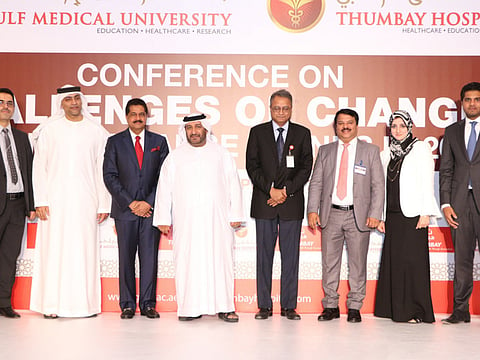New system to simplify insurance billing by 2018
Refined Diagnostic Related Group payment model to be implemented in Dubai

Dubai: Nearly 4.56 million insurance policies have been issued in Dubai compared to only 1.1 million before 2013, a senior Dubai Health Authority (DHA) official said on Thursday, adding that the next step is to usher in a billing system that will lead to enhanced ease of payment and greater transparency.
Dr Haidar Al Yousuf, director of Health Funding at DHA, and architect of the mandatory health insurance blueprint in Dubai, was delievering a keynote address at the Thumbay Hospital Insurance conference.
“After completion of all phases of the health insurance implementation, the next phase will be building excellence in the delivery of health care,” he said.
Akbar Moideen, vice-president of the Thumbay Health Care Group, said the conference was organised to focus on the Refined Diagnostic Related Group (DRG) payment model to be implemented in Dubai from 2018.
Easier payment
DRG is an internationally-vetted insurance billing system that will provide ease of payment and more transparency leaving no room for excess payment or overbilling, Dr Al Yousuf explained. It will be adopted by all health care facilities in Dubai by 2020.
Dr Al Yousuf added: “The International DRG system is the gold standard in international payment models. It has been implemented [in the UAE] under resolution 21 of 2016 in line with the third and last phase of the health insurance system.
"It heralds a change in the payment model. Usually, if a patient undergoes a particular surgery, the final bill varies widely from hospital to hospital. But now with DRG, there will be a fixed fee for every procedure.”
Mohammad Holaibi, regional business manager for 3M Gulf, which is providing the algorithms to implement DRG told Gulf News: “DRG is the quality cornerstone payment model which focuses on a lump sum or bundle payment for illnesses in both out and inpatient cases which focuses on quality in service rather than cost.”
When a patient reports to a hospital or clinic, the nature of his illness along with other variables such as his age, complication level, co-morbidities, etc, are taken into account to determine which algorithm the case falls under and the insurance pays a lump sum amount.
Optimising treatment
The patient is not put through needless or extraneous tests or prolonged hospital stays.
In fact, the hospital tries to optimise the treatment, the tests and the duration of the hospital stay as it does not stand to gain anything extra.
To streamline the system, DHA is in the process of creating quality parameters and fixing incentives as per the quality grade of the hospital. So if a clinic or hospital performs on par or beyond that fixed parameter, it will be awarded an incentive payment from DHA.
HOW SAVINGS OCCUR
If it performs below par, a certain percentage will be deducted.
This way, the hospital or health care centre, with better emphasis on quality, can reduce the patient’s duration of treatment and save vital resources while being incentivised by the relevant authority.
This system, which is present in countries with advanced health care systems, has proved to greatly improve the quality of health care delivery.
The DHA is currently running a pilot project in seven hospitals with models of parallel, or shadow billing, under DRG to demonstrate how both the health care facilities and the insurance provider stand to benefit under this optimal payment system.
Al Holiabi added: “This system will simplify the payment model and provide a far improved equation between cost and quality for both the buyer and provider of insurance. It is a tool to reach the goal of quality health care in the emirate.”
Dr Thumbay Moideen, founder president of the Thumbay Group, and Dr Salem Al Darmaki, adviser to the Minister of Health, felicitated health care and insurance-providers at the event.


